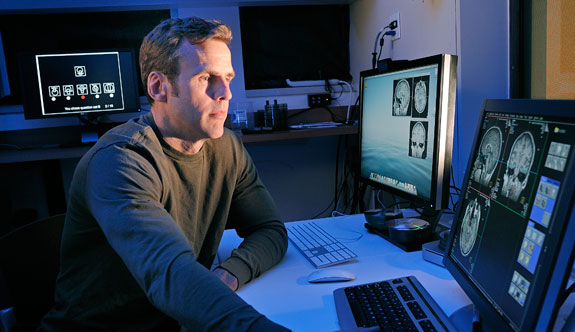PHILANTHROPY
 Read Montague, director of the Computational Psychiatry Unit at the Virginia Tech Carilion Research Institute
Read Montague, director of the Computational Psychiatry Unit at the Virginia Tech Carilion Research InstituteWhat do a condensed-matter physicist, a social psychologist, and a mathematical economist have in common? They, along with other top researchers, scientists, and students at Virginia Tech, are working to unlock the mysteries of the human brain.
The Computational Psychiatry Unit at the Virginia Tech Carilion (VTC) Research Institute combines technology with neuroscience, economics, and behavioral methods to understand the neural computations involved in human cognition and psychiatric illness.
One of the unit's areas of brain research is autism spectrum disorder, a focus that prompted one man to donate the proceeds of his softball tournament to the institute.
Patrick Patterson, of Montvale, Va., has a vested interest in the innovative research at the institute. His daughter, Brooke, was diagnosed with autism when she was 3 years old.
Patterson said he chose to support the institute after touring the facilities, meeting Executive Director Michael Friedlander, and learning about the research there. "We met with Dr. Friedlander and spoke with him," Patterson said. "He was telling us what they do there, what the money goes toward, and that pretty much sealed the deal."
Because of the complexity of the human brain, the institute has a variety of brain research programs with different areas of focus, Friedlander explained. "One subset of our programs focuses on understanding brain development, particularly in children," he said. "Our researchers are using a wide range of innovative technologies to develop new ways to enable very early and accurate diagnoses of autism spectrum disorders, to come up with potential new therapies, and to create precise, scientifically valid methods to evaluate the effectiveness of these and other possible treatments."
For instance, the computational, or mathematical, approach comes into play for the Computational Psychiatry Unit, which is directed by Read Montague. "The one thing we've learned a lot about are the parts that make up the brain and the dynamics among the parts," Montague explained. "The things we know less about are how to model thoughts and the dynamics of thoughts and how these develop through our life trajectory."
Montague's approach to brain research involves identifying patterns and applying mathematics as a way of characterizing and predicting psychiatric and neurological diseases and disorders, including autism spectrum disorder. "Our behavior—however complex it is, or however complex it is for the brain to underwrite it—is patterned," Montague said. "There are patterns to it. You recognize normal patterns; you recognize abnormal patterns. You can tell when somebody is off and when somebody isn't. And where there are patterns and numbers, there is mathematics."
The idea, he said, is that if researchers can identify patterns of healthy brains, they will be able to detect abnormal patterns, which could eventually lead to therapies or even treatments for mental illness and disorders.
To tackle such a colossal research challenge, Montague has assembled a team of researchers that includes a condensed-matter physicist, a social psychologist, a specialist in aesthetics, a physiologist, a mathematical economist, and even a doctoral student who is a geneticist and chemical engineer.
Despite the team's diversity, its members are all committed to a common goal: to gain insight into human cognition through an understanding of brain algorithms and the circumstances that can lead to their disruption.
All the work of the VTC Research Institute's teams of investigators requires funding that in large part comes from the National Institutes of Health, including the research into autism spectrum disorder, which is currently supported largely by the National Institute of Mental Health. "Grants, however, aren't the only sources of funding. In fact, private donations often allow researchers the most freedom," Montague said.
"When somebody hands you a check and says, 'I'll fund a postdoctoral position,' that's crucial," Montague said. "[Donors] put in your hands a resource that allows you to do research that you wouldn't otherwise be able to do, to take a risk you wouldn't otherwise take, to think about problems differently."
Patterson's first charity event proved such a success that he plans to run another one and once again donate the proceeds to the institute. "My ultimate goal is to raise as much money as I can [so that researchers] have what they need to find a definitive, black-and-white answer as to what causes [autism]," Patterson said. "And then [they can] move forward as to what they can do to help those who have autism perhaps cope a little better or to find a way to prevent it altogether."
For Montague and his team, that type of support from the community truly hits home. "It makes what we do a privilege," he said.